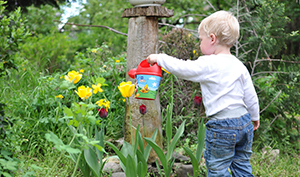Q: I’d like to get my children more involved in gardening this year. Any advice on how to make it fun and educational for them? — Jackie R., Newmarket
A: Gardening with your children offers many benefits. With the beginning of the season upon us, now is the perfect time to introduce your children to the joy of growing their own fruits and vegetables.
 Let’s hear from the kids
Let’s hear from the kids
For the best tips on how to make gardening fun and interesting in this age of constant pleas for screen time, I interviewed a few kids between the ages of eight and 10 to find out what their favorite gardening activities are. Here is what they reported.
Start with seeds: Engage your children from the get-go by bringing them to your local hardware store or garden center to select the seeds you will plant. The simple process of placing seed into prepared ground and actually seeing those seeds come to life often amazes children. As parents, grandparent or mentors, we can add to their appreciation by explaining the process of germination and describing the developmental process of these seedlings.
Create a space in your garden that’s completely their own: One child described growing her very own strawberry patch that was all hers to care for and share the harvest as she saw fit. Reportedly, her brother was allowed the occasional berry if there were enough to go around.
Don’t forget the flowers: My kids love to be able to go out into the garden and pick a fresh bouquet for their mother or grandmother. It means much more to them knowing that they have nurtured these plants with their own hands all the while. Flowers can be given away just to brighten someone’s day, or they could provide an opportunity for children to learn a bit about managing a small business. This season, my daughter and I plan to grow a few cut flowers for sale within our local community. She will be involved in all aspects of the operation, and my hope is that she will learn the value of hard work and a dollar earned, as well as the importance of seeing a project through to completion.
Let them eat: Naturally, at the top of the list was eating straight out of the garden. Sun-ripened cherry tomatoes emerged as a favorite for fresh snacking. When I was a county Extension agent in North Carolina, I would occasionally bring my kids along with me on farm visits to meet with local growers. I remember my son toddling down a long row of strawberries, picking out the biggest and best fruit. He learned first-hand just how tasty those field-ripened berries are, and the smile on his juice-stained face — and his continued love of berries straight from the garden — said it all.
Show your appreciation: Kids are so excited to show off their accomplishments and share what they have grown. Show them you’re proud of their accomplishments and encourage them to grow more next season.
Encourage study and creativity
Once your children have caught the gardening bug, take the activity a step further. Perhaps they like to write about their experiences in the garden, either through traditional journaling or poetry. My daughter is 11, and she loves to write songs and short poems.
Drawing or painting pictures of the garden as it grows can be another addition to the journal, as can photographs to document the season. Pressing flowers and leaves from plants within the garden can serve as a record of their accomplishments and challenges.
Gardening with kids also offers endless opportunities for lessons in math and science. Measuring plant growth, experimenting and hypothesizing, calculating space requirements and recording data are all components of a well-grounded foundation in biological sciences and mathematics.
I love to challenge my kids by handing them a tape measure and asking them to determine how long a row should be, or how many plants should fit at a given spacing. These practical applications reveal the value of such lessons in a way that kids can appreciate.
Take a positive time out
The most important thing is to take time to slow down and simply share with kids the appreciation of all the little marvels the garden has to offer. Remember how it was to be a child holding a ladybug in your hands for the first time, or looking through a magnifying glass at the intricate components and flawless beauty of a strawberry blossom. Just as we can give a child the gift of gardening knowledge, they give us the gift of seeing the wonder of things through their eyes.
Jeremy DeLisle is the program coordinator for the UNH Cooperative Extension Education Center. The center answers questions about gardening and more at answers@unh.edu, or by calling (877) 398-4769 Monday through Friday, between 9 a.m. and 2 p.m.

















































 Let’s hear from the kids
Let’s hear from the kids

